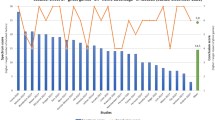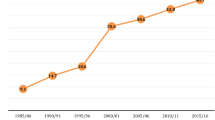Abstract
In fantasy sports, the goal is to gain as many points as possible. To get there, users have to choose players with the optimal price-to-performance ratio. However, finding these optimal players requires a great amount of time and effort, in which the users might not be willing to invest. Instead, they can use heuristic strategies. This paper investigates one such strategy for choosing squads based on the assumption that athletes starting for the favourite team of the match would bring users more points—in line with the representativeness heuristic. The data come from the Czech fantasy league according to the Premier League in the season 2015–16. The econometric model examines the percentage of squads a player was chosen into. The Ordinary Least Squares method used here uses control variables indicating performance, price, Czech nationality, and the game position of the athletes. The results show that users choose their squads primarily based on players’ past performances, but also take the favourite team into account. By applying the latter heuristic users aim to simplify the process decision-making but they overestimate the impact of belonging to a favourite team.
Similar content being viewed by others
References
Anagnostopoulos A, Cavallo R, Leonardi S, Sviridenko M (2016) Bidding strategies for fantasy-sports auctions. In: International conference on web and internet economics. Springer, Berlin. pp 102-115
Becker A, Sun XA (2016) An analytical approach for fantasy football draft and lineup management. J Quant Anal Sports 12(1):17–30
Billings AC, Ruihley BJ (2013) Why we watch, why we play: the relationship between fantasy sport and fanship motivations. Mass Communication and Society 16(1):5–25
Bonomo F, Durán G, Marenco J (2014) Mathematical programming as a tool for virtual soccer coaches: a case study of a fantasy sport game. International Transactions in Operational Research 21(3):399–414
Bryson A, Chevalier A (2015) Is there a taste for racial discrimination amongst employers? Labour Econ 34:51–63
Davis NW, Duncan MC (2006) Sports knowledge is power: Reinforcing masculine privilege through fantasy sport league participation. J Sport Soc Issues 30(3):244–264
Farquhar LK, Meeds R (2007) Types of fantasy sports users and their motivations. J Comput Mediat Commun 12(4):1208–1228
Fry MJ, Lundberg AW, Ohlmann JW (2007) A player selection heuristic for a sports league draft. J Quant Anal Sports 3(2):1–33
Getty D, Li H, Yano M, Gao C, Hosoi AE (2018) Luck and the law: quantifying chance in fantasy sports and other contests. SIAM Rev 60(4):869–887
Goldstein DG, Gigerenzer G (1999) How ignorance makes us smart: the recognition heuristic. In: Gigerenzer G, Todd PM (ed) Simple heuristics that make us smart, pp 37–58.
Holleman MC (2006) Fantasy football: Illegal gambling or legal game of skill. NCJL Tech 8:59
Hunter DS, Vielma J P, Zaman T (2016) Picking Winners Using Integer Programming. arXiv preprint arXiv:1604.01455
Kotrba V (2019) Direct preferences of sports fans: Is there a superstar effect in the fantasy league? J Behav Exp Econ 78:89–97
Leishman NC (2016) Daily fantasy sports as game of chance: Distinction without a meaningful difference. BYU L Rev 1043
Lopez-Gonzalez H, Griffiths MD (2018) Understanding the convergence of markets in online sports betting. Int Rev Soc Sport 53(7):807–823
Massey C, Thaler RH (2013) The loser's curse: decision making and market efficiency in the national football league draft. Manage Sci 59(7):1479–1495
Musco C, Sviridenko M, Thaler J (2017) Determining tournament payout structures for daily fantasy sports. In: 2017 Proceedings of the ninteenth workshop on algorithm engineering and experiments (ALENEX). Society for industrial and applied mathematics, pp 172–184
Ryan JM, Nelson SE, Gallucci AR, Lee JGL (2018) Daily and season-long fantasy sports participation and gambling-related problems among a sample of college students at three universities. Int Gambl Stud 18(3):395–407
Schirato T (2012) Fantasy sport and media interactivity. Sport Soc 15(1):78–87
Smith B, Sharma P, Hooper P (2006) Decision making in online fantasy sports communities. Interact Technol Smart Educ 3(4):347–360
Strumbelj E, Robnik-Sikonja M (2015) Predictive power of fantasy sports data for soccer forecasting. Int J Data Min Model Manag 7(2):154–163
Summers AE, Swartz TB, Lockhart RA (2007) Optimal drafting in hockey pools. Statistical thinking in sports. pp 263–276
Taggart J (2016) Is daily fantasy a form of gambling hidden by skill. Miss Sports L Rev 6:81
Trippiedi M (2014) Daily fantasy sports leagues: Do you have the skill to win at these games of chance. UNLV Gaming LJ 5:201
Tassoni CJ (1996) Representativeness in the market for bets on National Football League games. J Behav Decis Mak 9(2):115–124
Tversky A, Kahneman D (1974) Judgment under uncertainty: Heuristics and biases. Science 185(4157):1124–1131
Weiner J, Dwyer B (2017) A new player in the game: Examining differences in motives and consumption between traditional, hybrid, and daily fantasy sport users. Sport Mark Quart 26(3):140–152
Wilson PD, Ying Y (2003) Nationality Preferences for Labour in the International Football Industry. Appl Econ 35:1551–1559
Wisniewski T (2016) A Game of Skill or Chance: The Legality of Daily Fantasy Sports in Canada and the US. Trans L Contemp Probs 26:523
Woodland LM, Woodland BM (2015) The national football league season wins total betting market: the impact of heuristics on behavior. South Econ J 82(1):38–54
Acknowledgements
The author would like to express his gratitude to Pavel Kotrba and Kateřina Kotrbová and Zuzana Šaršounová for their help and consultation. Thanks also include the company Seznam, Inc. for providing the raw fantasy league data. Supported by the Grant No. IG506020 of the Internal Grant Agency by University of Economic in Prague.
Author information
Authors and Affiliations
Corresponding author
Ethics declarations
Conflict of interest
The authors declare that they have no conflict of interest.
Additional information
Publisher's Note
Springer Nature remains neutral with regard to jurisdictional claims in published maps and institutional affiliations.
Rights and permissions
About this article
Cite this article
Kotrba, V. Heuristics in fantasy sports: is it profitable to strategize based on favourite of the match?. Mind Soc 19, 195–206 (2020). https://doi.org/10.1007/s11299-020-00231-7
Received:
Accepted:
Published:
Issue Date:
DOI: https://doi.org/10.1007/s11299-020-00231-7




